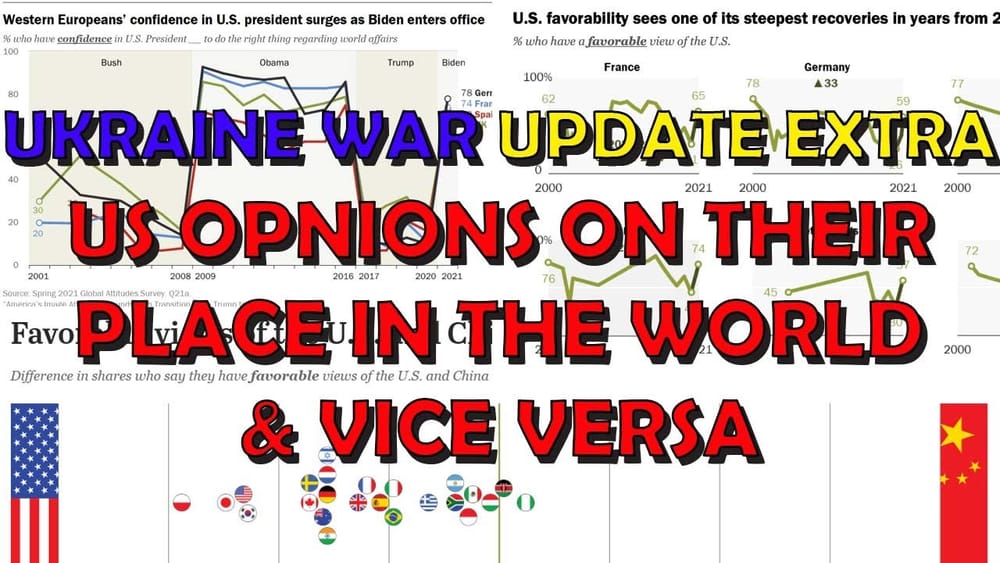Ukraine War Upd. EXTRA: US Opinions on Their Place in the World & Vice Versa
Table of Contents 📖
"We often think we're being so rational when we are doing um our political and moral evaluations when we're voting we go into the ballot box because hey i've thought a lot about this and it turns out that this is the most rational thing to do... no no no no no. And in fact... the idea is that we think we're being really rational but actually these things are pretty much determined and so when it comes to voting habits we're going to the ballot boxes because of things that are biologically and genetically determined in us to a large degree."
Hello Team
🎦 00:00-00:09⏩
Jonathan Pearce introduces the video as a Ukraine War Update EXTRA - an extra video with insights and analysis - this one is "stream of consciousness" about politics, psychology, data and US attitudes.
Return to top⤴️
2016 Pew Research Center data on US attitudes towards international involvement
🎦 00:09-03:17⏩
Jonathan discusses 2016 Pew Research Center data which showed that while opposition to an active US global role had decreased since 2013, a large proportion (41%) still felt the US did too much abroad. 57% felt that the US should focus on its own problems and let other countries deal with theirs, reflecting current voices in the US calling for reduced involvement in issues like the Ukraine war. Jonathan notes this data was from before Trump took office, and it would be interesting to see updated data.
Return to top⤴️
In-group/out-group dynamics and their influence on US international involvement
🎦 03:17-11:05⏩
Jonathan introduces the concept of in-group/out-group psychology - focusing on those similar to ourselves or within our immediate social circles and how this shapes attitudes towards helping others, especially in a political context. He argues that a shift in US attitudes towards greater international involvement observed between 2013 and 2016 was likely influenced by the emergence of ISIS, as it represented a direct threat, therefore shifting the focus from "out-group" to a matter of self-preservation for the "in-group". Jonathan highlights a key distinction between liberal and conservative approaches: conservatives tend to prioritize the "in-group", reflected in their support for charities focused on those similar to themselves, while liberals often demonstrate a more universalist morality, extending their concern to those outside their immediate group such as refugees. This difference in moral perspective, he argues, underpins current debates about issues like immigration and foreign aid to Ukraine.
Return to top⤴️
Psychological differences between liberals and conservatives and their impact on political views
🎦 11:05-16:03⏩
Jonathan delves into the research of Jonathan Haidt's "Moral Foundations Theory" which identifies six moral foundations: Care/Harm, Fairness/Cheating, Loyalty/Betrayal, Authority/Subversion, Sanctity/Degradation, and Liberty/Oppression. Conservatives tend to value all six relatively equally, while liberals prioritize care/harm and fairness/cheating. Jonathan uses the example of attitudes towards immigration, suggesting that conservatives' focus on "in-group loyalty" and "purity/sanctity" might lead them to view immigrants as rule-breakers and a threat to their cultural identity, while liberals, driven by "care/harm", may see them primarily as fellow human beings deserving of compassion. Jonathan argues that these fundamental differences in moral intuition, often influenced by genetics and biology, contribute significantly to the divide in liberal and conservative viewpoints on various social and political issues.
Return to top⤴️
The influence of disgust sensitivity on voting patterns and political ideology.
🎦 16:03-17:02⏩
Jonathan shifts focus to the role of disgust in shaping political ideology, citing research, including the work of psychologist David Pizarro. Pizarro's research, notably a 2008 study on the McCain-Obama election, suggests a strong correlation between an individual's sensitivity to disgust and their likelihood of voting conservative. Conservatives, he argues, exhibit greater sensitivity to things considered physically or morally "impure", potentially explaining their preference for maintaining traditional social structures and hierarchies. This inherent difference in disgust sensitivity, Jonathan suggests, highlights the influence of innate biological factors on political leaning, challenging the notion that political decisions are solely based on rational thought and free will.
Return to top⤴️
US desire for global military dominance contrasted with a preference for domestic focus
🎦 17:02-21:14⏩
Jonathan highlights a contradiction in the American psyche: a desire to be less involved in global affairs while simultaneously maintaining status as the sole military superpower. While advocating for a more inward-looking approach, focusing on domestic issues, there is a concurrent desire for global military dominance, a stance popularised by Trump's "America First" rhetoric. Jonathan points out that these two desires are inherently incompatible, arguing that true global leadership necessitates international engagement and strategic alliances. He uses the example of NATO, suggesting that advocating for a US withdrawal while striving for global military dominance is inherently contradictory.
Return to top⤴️
Global perceptions of US and Chinese influence and interference
🎦 21:14-27:14⏩
Jonathan draws on more recent data (November 2023) from a survey conducted across 24 countries, comparing global perceptions of the US and China. While a majority acknowledged US interference in other countries' affairs, they simultaneously viewed the US as a greater contributor to global peace and stability than China. This suggests an acceptance of US intervention when it serves a larger global good. Jonathan emphasises that the US benefits economically from global stability, and its involvement in resolving conflicts like the war in Ukraine ultimately serves its own interests. He argues that active international engagement, even if perceived as interfering, yields greater stability and ultimately, greater prosperity for the US. He notes a trend where high-income countries tend to rate the US more favorably than China in terms of considering their interests, contrasting with middle-income countries who view them more similarly.
Return to top⤴️
Global perceptions of Biden compared to Trump and Obama
🎦 27:14-38:30⏩
Jonathan presents data highlighting a significant disparity between domestic and international views of US presidents. Despite polarized opinions within the US, Biden enjoys significantly higher approval ratings globally, particularly when compared to his predecessor, Trump. Referencing data from June 2023, Jonathan reveals that Biden boasts a 59% favorability rating globally, starkly contrasting with his lower approval ratings within the US. This discrepancy, he posits, stems from a global perspective focused on Biden's handling of international affairs rather than domestic issues, which tend to be more central to the concerns of US voters. He emphasizes that Obama also enjoyed high global popularity, suggesting a trend where US presidents perceived as more internationally engaged and collaborative garner greater respect and trust on the world stage. Conversely, Trump's "America First" approach, often seen as isolationist and antagonistic, resulted in a significant decline in global perceptions of the US. Jonathan acknowledges that recent events like the Israel-Palestine conflict may have impacted Biden's international standing, making it crucial to continuously monitor these perceptions.
Return to top⤴️
The impact of internal political and moral psychology on foreign policy stances
🎦 38:30-46:46⏩
Jonathan summarises the key takeaway: our internal political and moral psychology significantly shapes how we view our nation's role in the world. He revisits the concept of in-group/out-group dynamics, suggesting that while past conservative approaches to foreign policy were often characterized by a more hawkish stance, potentially driven by a desire to maintain global dominance and protect the "in-group", there appears to be a shift. Modern-day conservatives, he argues, seem to be leaning towards a more isolationist approach, prioritizing domestic concerns and focusing on maintaining the perceived "purity" and traditions of their "in-group". Conversely, he observes what seems to be a shift among liberals who are increasingly demonstrating a more interventionist stance, particularly in situations like the Ukraine war, driven by a sense of global fairness and a moral obligation to protect those experiencing harm, even if they fall outside their immediate "in-group". Jonathan acknowledges that these are broad generalizations, but the shift in perspectives, he argues, warrants attention and further analysis. He emphasizes that understanding these internal moral and political compasses, often rooted in deep-seated psychological and biological factors, is crucial for comprehending how individuals and nations navigate complex global issues.
Return to top⤴️
Jonathan's personal experiences and concluding remarks
🎦 46:46-49:19⏩
Jonathan concludes by reflecting on his personal experiences, noting how discussions with his own family members, who hold different political views, consistently reinforce the validity of moral foundations theory. He recognizes the limitations of simplistic left-right political spectrums, advocating for a more nuanced understanding of political ideologies, suggesting tools like the political compass as a more comprehensive alternative. Jonathan emphasizes that while he has inevitably presented a simplified analysis of complex issues, his aim is to promote thoughtful discussion and encourage viewers to engage critically with data and psychological research to better understand the motivations and perspectives shaping the political landscape, both domestically and internationally. He reassures his audience that he'll return to more Ukraine-specific content in subsequent videos.
Return to top⤴️



